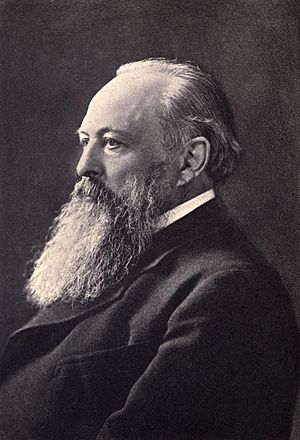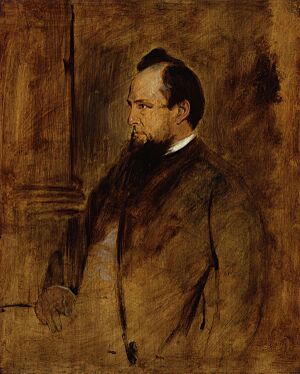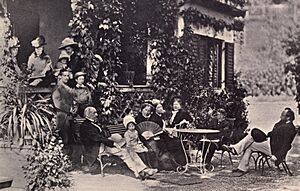John Dalberg-Acton, 1st Baron Acton facts for kids
Quick facts for kids
The Lord Acton
KCVO DL
|
|
|---|---|
 |
|
| Member of Parliament for Bridgnorth |
|
| In office 25 July 1865 – 1866 Serving with John Pritchard
|
|
| Preceded by | Henry Whitmore |
| Succeeded by | Henry Whitmore |
| Member of Parliament for Carlow Borough |
|
| In office 19 May 1859 – 25 July 1865 |
|
| Preceded by | John Alexander |
| Succeeded by | Thomas Stock |
| Personal details | |
| Born |
John Emerich Edward Dalberg-Acton
10 January 1834 Naples, Two Sicilies |
| Died | 19 June 1902 (aged 68) Tegernsee, Bavaria German Empire |
| Nationality | British |
| Political party | Liberal Party |
| Spouse |
Countess Marie von Arco auf Valley
(m. 1865) |
| Children | 6 |
| Parent |
|
| Education | Oscott College |
| Alma mater | Ludwig Maximilian University of Munich |
| Occupation | Historian; politician |
John Emerich Edward Dalberg-Acton, known as Lord Acton, was an important English historian, politician, and writer. He was born on January 10, 1834, and passed away on June 19, 1902. He is best remembered for his famous saying: "Power tends to corrupt, and absolute power corrupts absolutely."
Contents
Early Life and Education
John Acton was the only son of Sir Ferdinand Dalberg-Acton. His family had a long history, with roots in England, France, and Italy. His grandfather was a famous admiral and prime minister in Naples. John Acton became the 8th Baronet in his family in 1837.
His mother, Marie Louise Pelline, came from a noble German family. After his father died, she married the 2nd Earl Granville. John Acton was born in Naples, Italy.
He was raised as a Catholic and went to Oscott College until 1848. He then studied on his own in Edinburgh. He couldn't get into the University of Cambridge because he was Catholic. So, he went to Munich, Germany, where he studied at the Ludwig Maximilian University of Munich. There, he lived with Johann Joseph Ignaz von Döllinger, a famous theologian who became his lifelong friend. Döllinger taught him to love history and to see it as a way to understand freedom in society and politics.
Lord Acton was very good at learning languages. From a young age, he started collecting a huge library of historical books. He planned to use these books to write a "History of Liberty," which was a big project about freedom. In politics, he was always a strong Liberal.
Political Career and Views

Lord Acton traveled a lot in Europe. He spent time in major cities, reading old letters and documents from important historical figures. He became friends with many famous thinkers and historians. In 1855, he was made a Deputy Lieutenant of Shropshire, England. The next year, he joined a British mission to Moscow for the coronation of Alexander II of Russia.
Time in Parliament
In 1859, Acton moved back to England, to his home called Aldenham in Shropshire. That same year, he was elected to the House of Commons as a member for Carlow Borough in Ireland. He greatly admired and supported Prime Minister William Ewart Gladstone.
However, Acton wasn't a very active Member of Parliament (MP). His time in Parliament ended after the 1865 election. He tried to win a seat for Bridgnorth but lost. He tried again in 1868 but was not successful.
Views on America
Acton was very interested in the United States. He believed its federal system, where states had power, was the best way to protect individual freedoms. During the American Civil War, he supported the Confederacy. He believed they were fighting for States' Rights against a central government that he thought might become too powerful. He wrote notes to Gladstone that helped some British officials sympathize with the South.
Becoming a Peer
In 1869, Queen Victoria made Acton a peer, giving him the title Baron Acton, of Aldenham in the County of Shropshire. This happened mostly because of his close friend, Gladstone. Gladstone wanted Acton to have a stronger position when he went to Rome to argue against the Pope's plan to declare Papal Infallibility. Both Acton and Gladstone were against this idea.
A famous quote about their friendship is: "Gladstone influences all round him but Acton; it is Acton who influences Gladstone." In 1897, Acton was honored with the title of Knight Commander of the Royal Victorian Order. He also strongly supported Irish Home Rule, which meant giving Ireland more control over its own affairs.
Religion and Writings

In 1859, Acton became the editor of a Catholic magazine called The Rambler. In 1862, he combined it with another magazine. Even though he was a devoted Catholic, his historical research made him disagree with some of the Church's strict views. His independent thinking soon caused problems with the Church leaders.
In 1862, Cardinal Nicholas Wiseman publicly criticized his magazine. In 1864, the Pope declared that Catholic writers had to follow the Roman congregations' authority. Acton felt he couldn't honestly continue his writing while also being loyal to the Church, so he stopped publishing his magazine.
However, he continued to write articles for other publications, promoting liberal ideas in both politics and religion. He also gave many lectures on historical topics.
Opposing Papal Infallibility
In 1870, Acton and his mentor Döllinger spoke out against the idea of papal infallibility at the First Vatican Council. This idea meant that the Pope could not be wrong when speaking on matters of faith and morals. Acton went to Rome to try and stop it, but he was not successful.
Unlike Döllinger, Acton did not leave the Catholic Church. He continued to attend Mass regularly. The Church did not try to force him to change his views.
After this, he focused more on reading, studying, and spending time with friends. He was not just a scholar; he was also a man of the world. His main writings included essays on "Democracy in Europe" and lectures on "The History of Freedom." He also helped start the English Historical Review in 1886.
In 1874, when Gladstone wrote about the Pope's decrees, Lord Acton wrote letters to The Times. He showed how the Pope's actions had sometimes been inconsistent throughout history. This upset some strict Catholics, but the Church decided to leave him alone. Despite his disagreements, he believed that "communion with Rome was dearer than life."
Family Life
On August 1, 1865, Acton married Countess Marie Anna Ludomilla Euphrosina von Arco auf Valley. They had six children:
- Mary Elizabeth Anne Dalberg-Acton (1866–1951)
- Annie Mary Catherine Dalberg-Acton (1868–1917)
- Richard Lyon-Dalberg-Acton, 2nd Baron Acton (1870–1924)
- John Dalberg Dalberg-Acton (1872–1873)
- Elizabeth Mary Dalberg-Acton (1874–1881)
- Jeanne Marie Dalberg-Acton (1876–1919)
His nephew was Anton Graf von Arco auf Valley, a German count. In 1888, Acton inherited the title of Marquess of Groppoli from his cousin.
Professor at Cambridge
Lord Acton's reputation for being very knowledgeable grew, especially with Gladstone's help. Gladstone found him to be a valuable political advisor. In 1892, when the Liberal government came to power, Lord Acton was made a lord-in-waiting.
Finally, in 1895, he was appointed the Regius Professor of Modern History at Cambridge University. He gave lectures on the French Revolution and Modern History. He also helped plan the Cambridge Modern History, a large historical project, though he passed away before it was finished.
Death and Legacy
Lord Acton's health began to decline in 1901. He died on June 19, 1902, at his wife's family home in Tegernsee, Germany. He was buried in a small graveyard near Lake Tegernsee. His son, Richard Lyon-Dalberg-Acton, 2nd Baron Acton, inherited his title.
Before he died, his huge library of 60,000 books, filled with his own notes, was secretly bought by Andrew Carnegie. This was done so Acton could continue to use the library during his lifetime. After his death, the library was given to the University of Cambridge.
The Acton School of Business, founded in 2002 in Texas, was named in his honor.
Famous Sayings
Lord Acton is famous for many wise quotes, including:
- "Power tends to corrupt, and absolute power corrupts absolutely."
- "Great men are almost always bad men, even when they exercise influence and not authority."
- "There is no worse heresy than that the office sanctifies the holder of it."
- "History is the arbiter of controversy, the monarch of all she surveys."
- "Liberty is not the power of doing what we like, but the right of being able to do what we ought."
Images for kids
See also
 In Spanish: Lord Acton para niños
In Spanish: Lord Acton para niños
- Acton Institute for the Study of Religion & Liberty
 | Sharif Bey |
 | Hale Woodruff |
 | Richmond Barthé |
 | Purvis Young |


